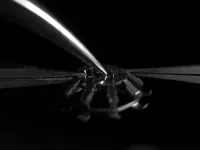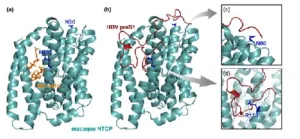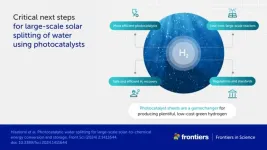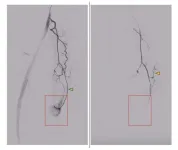(Press-News.org) Inspired by the diverse attachment organs of parasites, researchers have designed a millimeter-scale mechanism for soft tissue anchoring. Robert J. Wood and colleagues turned to the world of parasites as inspiration for developing methods to affix small-scale medical devices to the gastrointestinal tract or other soft tissues for sensing, sample collection, and extended drug release. While evolution has produced a wide range of different biomechanical structures that can attach to soft tissues, the authors ultimately chose to use the curved hook arrays employed by some tapeworm species as a research model. The resulting device, which is made of stainless steel and polyimide film, has a series of curved hooks, which are automatically deployed when external force is applied to the platform. The device was produced with laminate manufacturing techniques, in which layers are bonded together with adhesive. The device weighs 44 mg and measures less than 5 mm in diameter when deployed, small enough to be used with ingestible capsule robots. According to the authors, the device could be used in a wide range of medical applications and could also be employed to affix sensors to marine organisms, or to manipulate, repair, or attach objects to textiles.
END
Parasite-inspired medical devices
2024-12-03
ELSE PRESS RELEASES FROM THIS DATE:
Twenty-seven scientists become EMBO Young Investigators
2024-12-03
3 December 2024 – EMBO announces the selection of 27 life scientists as the newest members of the EMBO Young Investigator Programme. The programme supports young group leaders in Europe and beyond. The new young investigators will start in January, be active members of the programme for four years, and become part of an international network of nearly 800 current and former EMBO Young Investigators, Installation Grantees and Global Investigators. They carry out research across a wide range of life sciences topics from cell and computational biology to immunology and neuroscience.
"EMBO welcomes ...
The viral puzzle of why humans are susceptible to hepatitis B virus, but monkeys are not!
2024-12-03
Hepatitis B virus (HBV) infection is a leading cause of chronic liver diseases, that spreads among individuals through blood or body fluids. According to the World Health Organization, globally 1.2 million new HBV infections are reported every year. Caused by the HBV, these infections are limited to a few species, including humans and chimpanzees. Despite their close evolutionary relationship with these animals, old-world monkeys are not susceptible to HBV infections. In a new study published in Nature Communications on October 25, 2024, scientists including Dr. Kaho Shionoya from the Tokyo University of Science, Dr. Jae-Hyun Park, Dr. Toru Ekimoto, Dr. Mitsunori Ikeguchi, and Dr. Sam-Yong ...
Microfiber plastics appear to tumble, roll and move slowly in the environment
2024-12-03
PULLMAN, Wash. -- The first-known direct observations of the movement of microfiber plastics through a thin layer of soil-like particles show that they tend to tumble, roll and sometimes get stuck in spaces.
The findings, reported in the journal, Water Resources Research, mean that the fibers could get easily trapped in sediment. The work helps to improve understanding of the exposure risks and possible health impacts of the pervasive pieces of plastic, which are the largest pollutant in the world by mass.
“The ...
Prestigious EU research grants awarded to two Hebrew University researchers
2024-12-03
The Hebrew University of Jerusalem proudly congratulates two of its esteemed researchers for receiving prestigious European Research Council (ERC) grants. These grants, each valued at approximately 2 million euros, are awarded to researchers leading innovative projects and join a long tradition of Hebrew University scholars who have been recognized with this honor in previous years.
The recipients from Hebrew University are:
Prof. Dina Schneidman, The Rachel and Selim Benin School of Computer Science and Engineering, for her research titled "Deep Learning for Structure-Based Discovery of Adaptive Immune Receptors." Prof. Schneidman’s research ...
Experts reveal how revolutionary technological advances could use the sun to source hydrogen fuel
2024-12-03
In the future, we could fuel the world with sunlight and water – using sunlight to derive hydrogen fuel from H2O. Currently, most hydrogen that’s used as feedstock and fuel is derived from natural gas, and therefore doesn’t help us cut out fossil fuels. But Japanese scientists are leading the way towards a future powered by hydrogen, with new, easily-manufactured photocatalytic sheets and a proof-of-concept panel reactor which shows that it is possible to refine hydrogen fuel from water at scale.
“Sunlight-driven water splitting using photocatalysts is an ideal technology for solar-to-chemical ...
Muscle loss could increase dementia risk
2024-12-03
CHICAGO – Skeletal muscle loss is a risk factor for developing dementia, according to a study being presented today at the annual meeting of the Radiological Society of North America (RSNA).
Skeletal muscles make up about one-third of a person’s total body mass. They are connected to the bones and allow for a wide range of movements. As people grow older, they begin to lose skeletal muscle mass.
Because age-related skeletal muscle loss is often seen in older adults with Alzheimer’s disease (AD) dementia, this study aimed to examine whether temporalis muscle ...
Minimally invasive procedure relieves knee arthritis
2024-12-03
CHICAGO – A minimally invasive procedure provides significant relief from knee pain and may prevent the need for knee replacement surgery in people with osteoarthritis, according to a study being presented this week at the annual meeting of the Radiological Society of North America (RSNA).
“This study addresses osteoarthritis, which is a significant public health issue and the leading cause of chronic pain and disability worldwide,” said the study’s lead author, Florian Nima Fleckenstein, M.D., interventional radiologist at Charité – University Hospital Berlin in Germany. “With millions of people affected by knee ...
Scientists question the use of “tipping point” metaphor in climate change discussions
2024-12-03
A group of scientists, including researchers from Rutgers University-New Brunswick, Princeton University and Carleton University, has questioned the accuracy and utility of the metaphor “tipping point” in calling attention to the threat of climate change.
The phrase, while perhaps initially useful as a clarion call that warns about sudden, drastic changes, may now be confusing the public and impeding action, researchers said.
Writing a perspective in Nature Climate Change, the scientists, from the Rutgers Climate and Energy Institute, Princeton’s Center ...
Ecosystems: New study questions common assumption about biodiversity
2024-12-03
Plant species can fulfil different functions within an ecosystem, even if they are closely related to each other. This surprising conclusion was reached by a global analysis of around 1.7 million datasets on plant communities. The study was led by Martin Luther University Halle-Wittenberg (MLU) and the University of Bologna. Their findings overturn previous assumptions in ecology. The study was published in "Nature Ecology & Evolution" and offers insights for nature conservation.
When ...
DNA secreted by tumor cell extracellular vesicles prompts anti-metastatic immune response
2024-12-03
Specially packaged DNA secreted by tumor cells can trigger an immune response that inhibits the metastatic spread of the tumor to the liver, according to a study led by researchers at Weill Cornell Medicine, Memorial Sloan Kettering Cancer Center and Korea’s Yonsei University. The discovery improves the scientific understanding of cancer progression and anticancer immunity, and could yield new clinical tools for assessing and reducing metastasis risk.
In the study, reported Dec. 3 in Nature Cancer, the researchers examined cancer cells’ secretion of short stretches of DNA packaged on tiny capsules called extracellular ...








